Writing is about learning to pay attention and to communicate what is going on. Now, if you ask me, what’s going on is that we’re all up to here in it, and probably the most important thing is what we not yell at one another. Otherwise we’d all just be barking away like Pekingese: “Ah! Stuck in the shit! And it’s your fault, you did this…” Writing involves seeing people suffer and, as Robert Stone once put it, finding some meaning therein. But you can’t do that if you’re not respectful. If you look at people and just see sloppy clothes or rich clothes, you’re going to get them wrong.
-Anne Lamott, Bird by Bird
If you’re like me, you’ve managed to cram as much media into your precious free time as your conscience allows. Maybe I’m reading one of the Dresden Files books about an occupational wizard, or playing through Dragon Age as a particularly cute Qunari rogue (or at least as cute as those horrible hairstyles allow). I’m constantly bombarded with stories and interesting characters, their dreams and dramas. And it’s so easy to experience it without actually absorbing it.
It turns out that paying attention takes work.
The quote from Lamott asks prospective writers to find meaning in what they see and perceive. To pay attention, and to let your interpretation guide your fingers as you type out what it is you have to say. And while the quote was probably intended with the real world in mind, it can just as easily be applied to fictional ones as well.
And since attention is an ever-decreasing resource, I started to wonder if there was some way I could incorporate some training into my media-consuming regimen. How could I force myself to go beyond basic enjoyment and actually absorb what I saw?
The answer came in the form of first episodes. I wanted to take a toe-deep plunge into a dozen different fictional worlds, and identify them afterwards in two sentences: a statement and a question. It not only forced me to be alert—it gave me vague ideas for future writing material. Just like driving in an unfamiliar area, the first episode of a series prevents your mind from going into auto-pilot because the territory just isn’t familiar to you yet.
So what did I come up with? Besides a great excuse to watch 12 anime episodes, the results below!
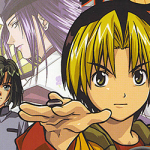
Name: Hikaru no Go
Statement: The spirit of a Go master trapped in a Go board helps a young boy win.
Question: What historical skillset will prove valuable in today’s society?

Name: Sword Art Online
Statement: Virtual Reality game captures players with life and death consequences.
Question: How else can we take the modern day familiar and add life and death consequences to it?

Name: Fairy Tale
Statement: Light-hearted High fantasy world revolving around magical clubs and special abilities.
Question: How can we take a traditionally serious trope and turning it casual/popular?
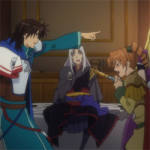
Name: Legend of Legendary Heroes
Statement: Foreign kingdom searching for artifacts across the world.
Question: How can having two characters setting two different tones work in the same story?

Name: Amagi Brilliant Theme Park
Statement: Human asked to manage theme park of fantasy-realm workers.
Question: How can a modern skillset prove valuable to other-worldly beings?

Name: Freezing
Statement: Future fighting babes are paired with guys in order to fight off alien entities.
Question: How can forced pairing mechanics implement romance in a unique way?

Name: Soul Eater
Statement: Pairs of wielders and weapon people hunt down spirits for the Grim Reaper.
Question: How can having protagonists in the employ of a well-known mythical figure set a unique tone?
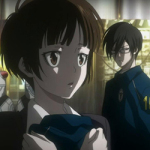
Name: Psycho Pass
Statement: Future task force hunts criminals guilty of thought crimes with help of criminals.
Question: How does having a protagonist with ideals that go against his/her “job” drive the theme?
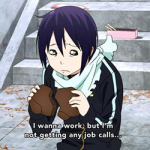
Name: Noragami
Statement: A minor god trying to make it big is saved by a girl who is now half dead and alive.
Question: How can having other-worldy beings doing mundane jobs humanize them?

Name: My Little Monster
Statement: A bookworm girl becomes friends with a naive and aggressive boy.
Question: How can an overly masculine caricature be presented in a palatable way to women?
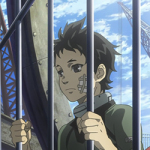
Name: Deadman Wonderland
Statement: A boy accused of murder must entertain tourists to escape death row.
Question: What does breaking the protagonist down to his limits and building him back up give the reader?

Name: Arpeggio of Blue Steel
Statement: Boy joins with an enemy sub who takes the form of a girl.
Question: How does giving human form to often personified objects change how said object is viewed?
This was a fun exercise that I’d recommend to anyone. Just a couple of sentences is all it takes to force your mind into that attentive mindset. Paying attention pays off!


Recent Comments